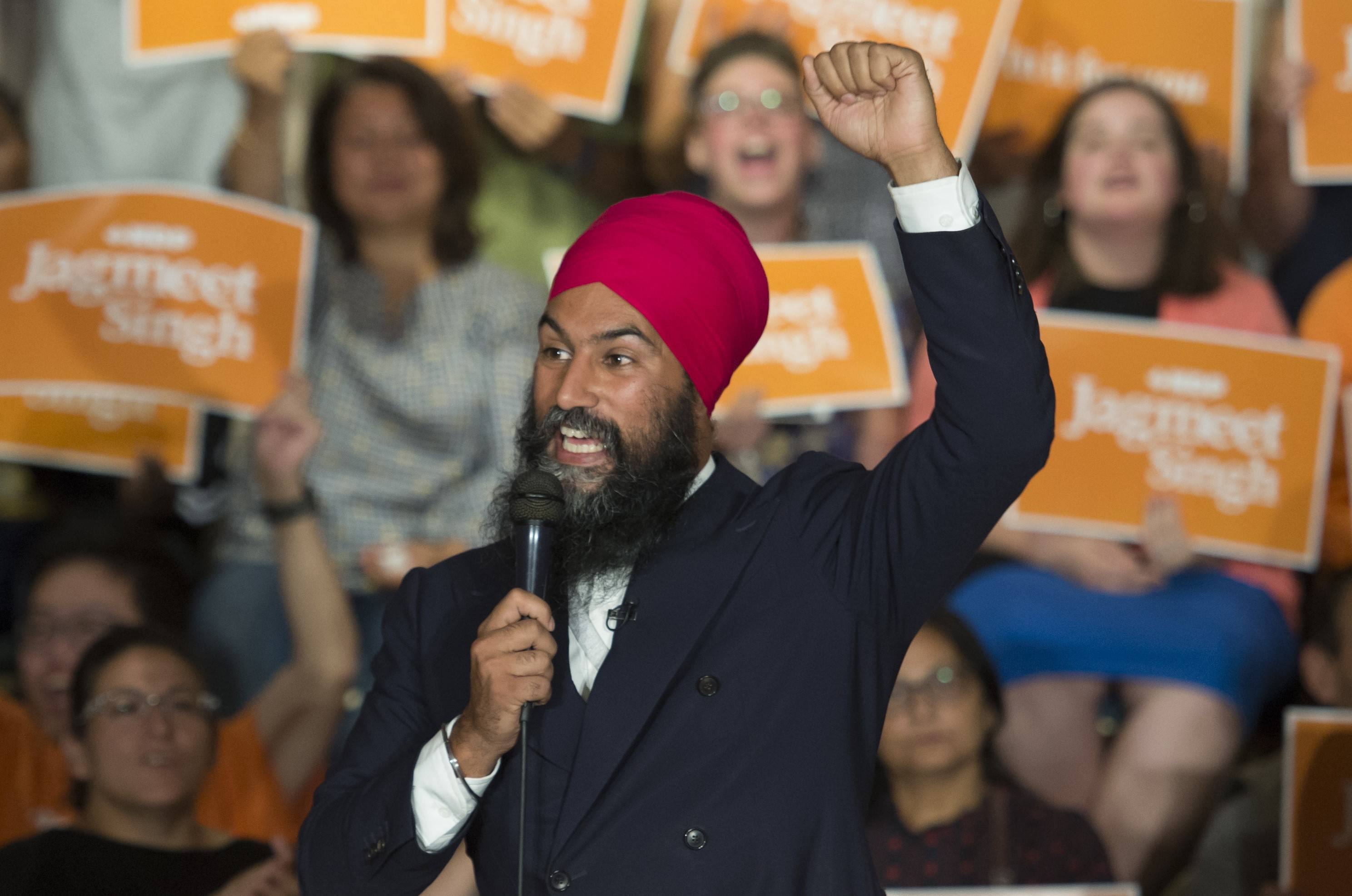Barring a shift in public opinion that would make the Orange Wave look like a ripple, the New Democrats’ dream in Quebec is dead. The party’s surge in the polls in 2011 took place over a solid month: Nationwide they climbed from 18 per cent on April 4 to 31 per cent on April 30, according to Léger Marketing; in Quebec, they went from 15 per cent to 40 per cent. The election was May 2: Jack Layton was headed to Stornoway with 31 per cent of the popular vote nationwide and 43 per cent in Quebec.
Two leaders later, with 11 days to go, CBC’s poll tracker has the Dippers at 14 per cent nationwide and 10 per cent in Quebec. Leader Jagmeet Singh’s well-reviewed performance in the leaders’ debates thus far might have been worth a four-point bump to 18 per cent, according to a Léger poll released this week, but the party still languishes at 13 per cent in Quebec. Never mind 2011 — they did nearly that well in 2008. They won a single seat in Quebec.
The futility of Singh’s situation makes it all the sadder to see him defending Quebec’s right to cleanse its civil service of teachers, police officers, Crown attorneys and other people in positions of authority who wear hijabs or turbans — not just or even mainly because he wears a turban, but because it can only be damaging the party’s prospects elsewhere in the country. The NDP might well be a busted flush under any leader at this point, but if there’s any campaign where a third party ought to be able to seize some momentum and scare the pants off the Big Two, it’s the impossibly dreary, cynical affair going on right now. It’s awfully depressing to see the traditional third party being just as cynical.
Last week, Thomas Mulcair accused Singh of having “totally abandoned” the NDP’s position on defending minority rights. That’s certainly one way to look at it. But the other way is that Singh is simply taking the Sherbrooke Declaration — the 2005 document that laid the groundwork for the party’s breakthrough in Quebec — to its logical, asymmetrical-federalist conclusions.
“The people of Quebec, especially since the Quiet Revolution, have expressed a clear desire to ‘vivre ensemble’ and build a social and political project based on solidarity,” the declaration reads. “The construction of a modern state and a social blueprint for Quebecers has centred around the Quebec state. We commend Quebecers for establishing institutions allowing them to develop differently in linguistic, social, cultural and economic terms.”
That being the case, the declaration makes it clear: Quebec gets special, hands-off treatment. “The New Democratic Party believes that asymmetrical federalism is the best way to consolidate the Canadian federal state with the reality of Quebec’s national character” it reads. “That means that Quebec has to have specific powers and room for manoeuvring.”
Of course, the declaration’s drafters were imagining a social-democratic utopia developing in Quebec around which all Canadian progressives could rally. But as a path to electoral success, which was the document’s primary aim, it’s theoretically no less valid today. But whereas it used to involve sacrificing the principle of a strong federal government, now it involves sacrificing something rather more central: protecting minority rights.
It’s awfully depressing to see the traditional third party being just as cynical as the Big Two
Not so long ago, we might reasonably have hoped this approach could bring Quebec back into federal politics for good. It was a compromise in principles, but the NDP was hardly alone in the compromise. Most of what it made official in the Sherbrooke Declaration, the other parties have been perfectly happy to concede along the way: In the TVA debate, Conservative leader Andrew Scheer bragged about all the special treatment his party had given Quebec (the nationhood motion in the House of Commons, the seat at UNESCO), and all that it would give Quebec in the future. Only Andrew Scheer would allow Quebec a single tax return controlled by the province, he boasted. The others are weak on tax returns! Weak on Quebec!
Asymmetrical federalism might well work again in the future, too. Younger Quebecers have little time for the ghastly perversion of secularism being foisted upon them by bitter, death-rattling sovereigntists who never managed to close the real deal. But for now, despite all four federalist parties walking on eggs on the issue, there seems little point to all this humiliating hedging on Canadians’ basic rights.
The Liberals are still leading in Quebec, despite Justin Trudeau “leaving the door open” to federal intervention; the Conservatives are still struggling, despite Scheer promising a hands-off approach, and the Bloc Québécois is threatening to eat their lunch; and the NDP are nowhere. They could at least be nowhere with their principles.
• Email: cselley@nationalpost.com | Twitter: cselley




























